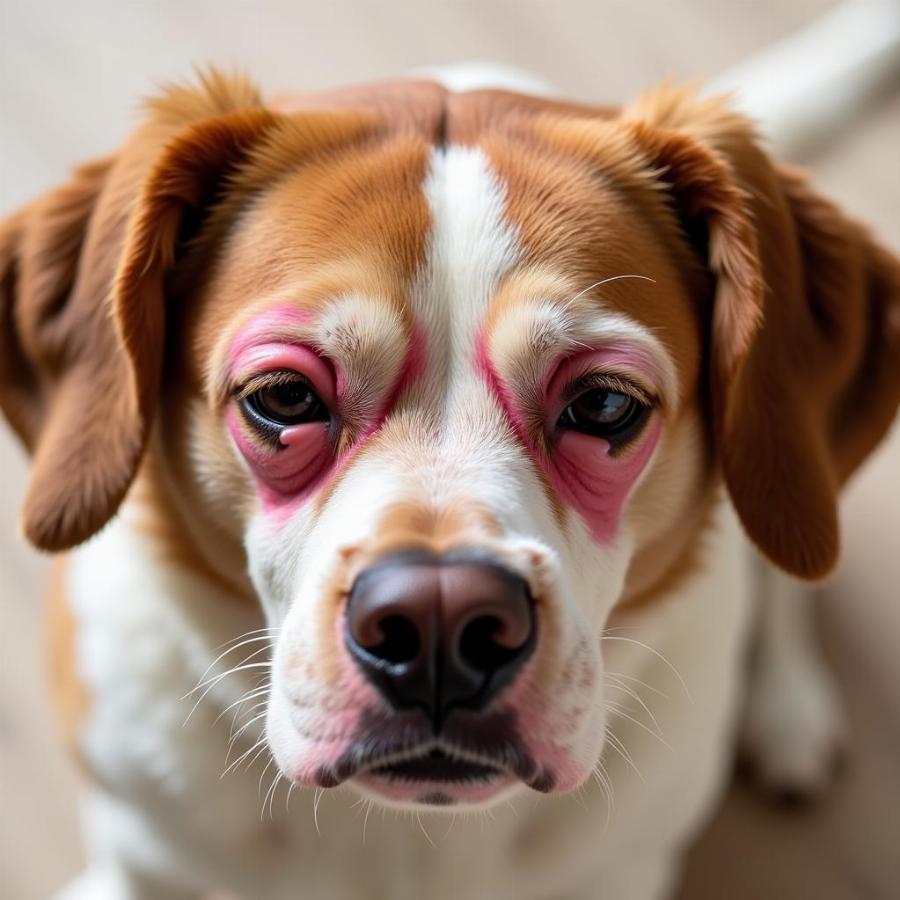Bordetella, often referred to as kennel cough, is a highly contagious respiratory disease in dogs. While the Bordetella vaccine significantly reduces the risk of infection, it’s essential for dog owners to be aware of potential side effects of dog vaccinations, particularly for Bordetella. Understanding these potential reactions can help you prepare and ensure your furry friend receives the best possible care.
Understanding Bordetella and its Vaccine
The Bordetella bronchiseptica bacteria, along with other viruses like canine parainfluenza virus, cause kennel cough. This infection leads to inflammation of the upper respiratory tract, resulting in a persistent, hacking cough. The Bordetella vaccine helps protect dogs from this illness, especially in environments where they interact with other dogs, such as kennels, dog parks, and training classes. The vaccine is available in injectable, intranasal, and oral forms.
Common Side Effects of the Bordetella Vaccine
While generally safe, the Bordetella vaccine, like any other vaccine, can sometimes cause mild side effects. These reactions are usually temporary and resolve on their own. Common side effects can include:
- Lethargy: Your dog might seem a bit tired or less active than usual for a day or two after vaccination.
- Loss of Appetite: A decreased interest in food can occur, but it’s typically short-lived.
- Sneezing: Particularly with the intranasal vaccine, sneezing is a common and expected reaction.
- Mild Cough: Ironically, a mild cough can sometimes occur after the Bordetella vaccine.
- Soreness at the injection site: If your dog receives the injectable vaccine, some soreness or swelling at the injection site is possible.
Less Common and More Serious Side Effects
While rare, more serious side effects can occur. These warrant immediate veterinary attention:
- Facial Swelling: This can be a sign of an allergic reaction and requires prompt medical care.
- Difficulty Breathing: Any signs of respiratory distress, such as labored breathing or wheezing, are serious and should not be ignored.
- Hives: These itchy welts on the skin can indicate an allergic reaction.
- Vomiting and Diarrhea: While some digestive upset can be expected, persistent vomiting and diarrhea should be reported to your veterinarian.
- Collapse: In extremely rare cases, anaphylactic shock can occur, which is a life-threatening allergic reaction.
 Dog with Allergic Reaction Symptoms after Vaccination
Dog with Allergic Reaction Symptoms after Vaccination
What to Do if Your Dog Experiences Side Effects
If your dog experiences any side effects after receiving the Bordetella vaccine, monitor them closely. For mild reactions, such as lethargy or loss of appetite, provide extra comfort and ensure they have access to fresh water. If the symptoms persist for more than a couple of days or worsen, contact your veterinarian. For severe reactions, such as facial swelling or difficulty breathing, seek immediate veterinary care.
Minimizing the Risk of Side Effects
Talk to your vet about your dog’s health history. Dog shots at tractor supply may be a convenient option, but a vet can assess your dog’s specific needs and recommend the best course of action. This open communication will help your veterinarian determine the most appropriate vaccination schedule and method for your dog.
Is the Bordetella Vaccine Right for Your Dog?
The decision of whether or not to vaccinate your dog against Bordetella should be made in consultation with your veterinarian. They will consider your dog’s lifestyle, risk factors, and overall health. Dog boarding montrose co and other similar facilities often require this vaccination. For dogs frequently exposed to other dogs, the benefits of vaccination typically outweigh the risks of side effects. If you’re unsure about the necessity of the Bordetella vaccine, your vet can help you make an informed decision. 9 way shot for dogs often includes Bordetella, so discuss the individual components with your vet if necessary.
Conclusion
The Bordetella vaccine is an important tool in protecting dogs from kennel cough. While side effects are generally mild and temporary, it’s crucial to be aware of the potential reactions and seek veterinary care if necessary. By understanding the side effects of dog vaccinations, specifically Bordetella, you can make informed decisions about your dog’s health and provide them with the best possible care. Open communication with your veterinarian is key to ensuring your dog receives the appropriate vaccinations and minimizing any potential risks. Remember, 5 in 1 dog vaccine and 7 in 1 vaccine for dogs are other options, so discuss which is best for your pet.
FAQ
-
How long do Bordetella vaccine side effects last? Typically, mild side effects resolve within a few days.
-
Can puppies get the Bordetella vaccine? Yes, puppies can typically receive the vaccine starting around 6-8 weeks of age.
-
How often does my dog need the Bordetella vaccine? The frequency depends on your dog’s lifestyle and risk factors. Discuss this with your veterinarian.
-
What are the symptoms of kennel cough? The most common symptom is a persistent, dry, hacking cough.
-
Can the Bordetella vaccine cause kennel cough? While rare, the vaccine can sometimes cause a mild cough.
-
Is the Bordetella vaccine always effective? While the vaccine significantly reduces the risk of infection, it doesn’t guarantee complete immunity.
-
What should I do if my dog is having an allergic reaction to the vaccine? Seek immediate veterinary attention.
Further Questions and Related Articles:
- What other vaccines does my dog need?
- How can I boost my dog’s immune system naturally?
- What are the signs of a healthy dog?
Beaut Dogs is your trusted source for comprehensive information on the world of canine companions. We offer expert advice on everything from breed selection to health care, nutrition, and training. For personalized guidance and answers to your specific questions, reach out to our team at [email protected]. We are committed to providing you with accurate and reliable information to help you provide the best possible care for your beloved dog. Visit Beaut Dogs today!